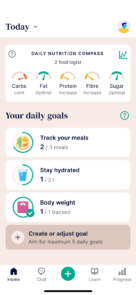
Managing your weight after stopping weight loss medication
It’s natural to be concerned about whether coming off weight loss injections is going to lead to weight regain. The right approach and lifestyle adjustments make it possible to avoid or minimise weight regain for long-term weight management.
If you’ve been taking weight loss medication on a Tier 3 programme, like Oviva, you’ll have received support on adopting healthier lifestyle changes that support long-term weight loss, even after medication.
Staying true to the healthy weight loss habits you’ve developed during your time on weight loss medication is the key to managing your weight after your prescriptions stop.
Key Takeaways
- When you stop taking weight loss medication, anxiety about weight regain is normal, but regaining weight is not inevitable.
- By learning healthy behaviours that become positive lifestyle habits, you can learn to manage your weight over the long term, even without medication.
- Professional support can play a vital role in helping you to eat well, exercise, manage emotions, set realistic expectations and adopt a holistic approach to your well-being.
- Oviva’s tailored support from healthcare professionals, including dietitians and psychologists, includes a personalised, post-medication weight management strategy.

Table of Contents
How to stop taking weight loss medication without regaining weight
Why someone might need to stop taking weight loss medication
Why do people gain weight after stopping weight loss medication?
The role of professional support in maintaining weight loss
How to stop taking weight loss medication without regaining weight
Stopping weight loss medication doesn’t mean losing the progress you’ve made. By continuing the habits and strategies that supported your success so far, like balanced nutrition, regular physical activity, and good sleep, you can maintain your results over the long term.
Here’s how to keep moving forward:
- Try to maintain a balanced diet and focus on nutritious meals so your body gets what it needs. It may be beneficial to follow a healthy diet plan for a short period to get this balance right.
- Our free online calorie counter tool can provide guidance on the amount of food you should aim for each day. Strict calorie counting is not recommended by Oviva, but having a broad sense of ideal food portions is helpful.
- Staying active can also be extremely helpful for long-term weight management. Combining cardiovascular exercise and strength training optimises results and maximises muscle mass and your metabolism. The NHS recommends aiming for 150 minutes of moderate-intensity activity per week or 75 minutes of more vigorous exercise.
- It’s also advisable to get plenty of sleep if you can. Healthy adults usually need between 7 and 9 hours of sleep every night, and insufficient sleep can lead to increased cravings. For best results, try to follow the same sleep schedule every day, take steps to optimise your temperature at night and relax for around an hour before trying to sleep.

Why someone might need to stop taking weight loss medication
You may need to stop taking weight loss medication for various reasons, including achieving your weight loss goals, hitting NHS time limits, or making changes to your weight management plan to ensure your methods are sustainable long into the future.
In a small number of cases, the side effects associated with semaglutide and other ingredients can be severe enough for people to opt out of taking it. There may also be a medical need behind stopping the medication, such as pregnancy, breastfeeding, or having an operation.
If you’re paying for your weight loss injections, the costs may also become too much. In which case, it’s worth checking if you’re eligible for Oviva. The Oviva programme can provide access to weight loss medication on the NHS for the cost of a standard prescription.
Oviva patient success stories:

 -22kg
-22kg
Heidi (53)

 -25kg
-25kg
Martin (34)

 -32kg
-32kg
Patricia (53)
Why do people gain weight after stopping weight loss medication?
One of the biggest reasons people regain weight after stopping weight loss medication is because they experience an increase in appetite.
Wegovy, Mounjaro and Saxenda belong to a class of medications called GLP-1 agonists, which work by suppressing your appetite. Once you stop taking injections, your appetite gradually returns, and you may want to eat more.
It’s also important to view weight management holistically. When you stop taking weight loss medication, you’re not “cured” like you might be after taking other medicines. Your weight must be continually managed; if you’re not careful, you can easily fall back into old habits.

The role of professional support in maintaining weight loss
Working with a dietitian or weight loss coach can help you understand weight loss fluctuations, identify triggers, understand your own relationship with food and develop a sustainable approach to managing your weight, with or without medication.
If you’re eligible, the Oviva programme provides access to dietitians and coaches, with an emphasis on personalised care and sustainable weight management strategies. Psychological support is also available, helping you to manage the emotional toll of weight management.
In addition to accessing professional support, it’s good to try to develop a social support system. This can include your family, friends, or a weight loss support group.
Realistic expectations and mental health considerations
Setting realistic expectations is vital to managing your weight, especially after stopping weight loss medication. Some weight fluctuation is normal, and a small amount of weight regain is not an immediate cause for concern, nor is it a sign of failure.
Try to prioritise overall health and well-being rather than obsessing about numbers on a scale. At the same time, make sensible adjustments if you do notice your weight increasing.
If you feel overwhelmed by the emotions that surround weight management, fluctuations and stopping weight loss medication, it may be a good idea to seek professional support.
Learning to deal with emotions concerning food, exercise, and weight can be important for developing a sustainable and successful weight management strategy.
How Oviva can support you in managing your weight after stopping medication
Oviva can help you manage your weight after stopping weight loss medication:
- Personalised support: Receive tailored support from dietitians, psychologists and other healthcare professionals while directly communicating with a weight loss coach through the Oviva app. These sustainable lifestyle changes are what will help you on your weight loss journey after finishing your medication.
- Building healthy habits: The Oviva programme focuses on promoting healthy behaviours related to eating, exercise and self-care that can develop into lasting habits.
- Professional guidance: You’ll receive continuous guidance from healthcare professionals, with regular check-ins. Working with these professionals, adjustments can be made to your weight loss plan based on the goals you set and the progress you achieve.
- Managing emotional eating: Regular contact with coaches, psychological support and a holistic plan help you manage emotional eating by identifying triggers and understanding how to action change.
- Complementing medication: Oviva can provide access to weight loss medications, but the programme is designed to complement medication rather than rely exclusively on it. You’ll develop the skills, strategies, and knowledge to transition smoothly off medication.







